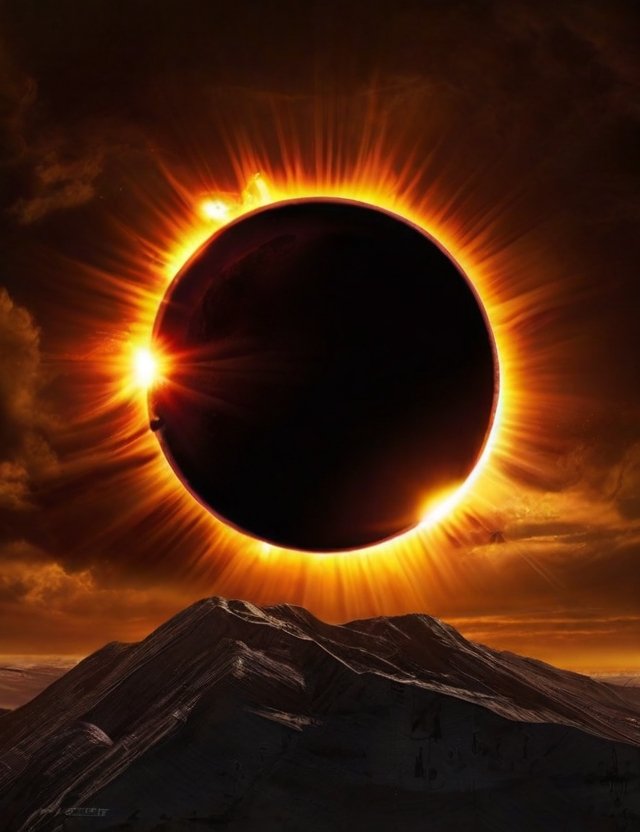
On April 8, 2024, North America will witness a rare celestial spectacle—a total solar eclipse. As the moon gracefully passes between the sun and the Earth, the daytime will turn to twilight, and millions of eyes will turn skyward in wonder. Yet, with all its scientific magnificence, some will look upon this event with a notion much weightier than just the alignment of celestial bodies. They may see it as a harbinger of the end times, a sign of impending catastrophe or divine intervention. But what lies at the intersection of astronomy and prophecy? This post aims to explore whether this occurrence holds any mystical or apocalyptic significance or if it’s just one more cycle in our cosmic dance.
Understanding Solar Eclipses
To unravel the mystery of what the solar eclipse might signify, we must first understand the event itself. A solar eclipse transpires when the moon moves directly between the sun and Earth, casting its shadow on our planet. There are three types: total, partial, and annular, each with its own unique spectacle. Astronomers can predict these occurrences with precision, and they happen on average about once every 18 months somewhere on Earth. They are rare and stunning examples of gravitational interplay in our solar system.
Historical Perceptions of Eclipses
For millennia, humans gazed into the sky with a mix of awe and fear. Eclipses were often associated with supernatural beings and were seen as everything from a serpent devouring the sun to the heavens’ way of communicating profound messages. They were pivotal in shaping mythical narratives and cultural beliefs, believed to foretell wars, plagues, the rise and fall of empires, and even the end of the world. Some of these interpretations continue to echo in the folklore and legends of many societies.
End Times Prophecies
The association of solar eclipses with apocalyptic events is not new. Many religious and cultural traditions include narratives about cosmic signs heralding the end of the world. In Christianity, the Bible’s book of Revelation speaks of the sun turning black as sackcloth of hair, and the moon becoming like blood, tropes often applied to eclipses. Some Islamic Hadiths make similar references, while other cultures and spiritual systems also cite celestial events as indicators of grand-scale changes or transitions.
Scientific Explanations
While the eclipse’s darkening may align poetically with ancient texts, modern scientific understanding casts a different light (or shadow) on such events. Eclipses are entirely predictable and explainable natural phenomena, unrelated to human behavior or historical events. The alignment comes from the cyclical movement of our orbiting bodies. Astronomers and astrophysicists study these events with rigor and have furthered our understanding of the cosmos, delineating between myth and reality.
Interpreting Signs and Symbols
Is there room for both astronomy and spirituality in the eclipse’s shadow? Absolutely. Astronomy can certainly coexist with spiritual beliefs. The sky has been, and continues to be, a source of wonder and inspiration, uniting us at times of both great joy and sadness. Interpreting these celestial events is a personal and communal experience that deserves respect for the breadth and depth of meanings it may hold.
The Role of Critical Thinking
It’s essential to approach celestial events with a degree of skepticism, but also with an understanding of their cultural and symbolic weight. Critical thinking allows us to appreciate both the natural beauty of an eclipse and the varied ways societies perceive and interpret the world around us. Science and spirituality can be directions on a mutual path, guiding us to different truths about humanity and the universe.
Conclusion: The Importance of Education
The solar eclipse on April 8, 2024, will offer a show of cosmic cosmic proportions influencing many aspects of our lives. Whether you enjoy the event from a scientific perspective, as an expression of your culture, or as a moment of personal reflection, the elegance of the eclipse transcends our earthly concerns about the “end times.” What this event truly signifies is an opportunity for education, for understanding the celestial mechanics at work, and for appreciating the myriad ways humans relate to the cosmos. It is a chance to ponder nature’s grandeur while upholding the mantle of reason and curiosity that propel us forward, both as a species and as individuals. When the moon’s shadow touches the Earth, may it serve as a reminder not of impending doom, but of the endless cycle of change and renewal that defines our universe—a universe eagerly waiting for us to unlock its mysteries, day after extraordinary day.